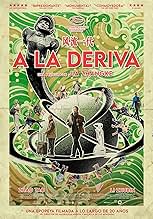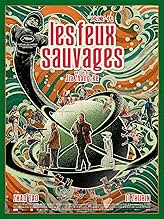VALUTAZIONE IMDb
6,7/10
1696
LA TUA VALUTAZIONE
Una donna cinese vive per sé in silenzio, celebrando la prospera Belle Epoque con canti e danze.Una donna cinese vive per sé in silenzio, celebrando la prospera Belle Epoque con canti e danze.Una donna cinese vive per sé in silenzio, celebrando la prospera Belle Epoque con canti e danze.
- Regia
- Sceneggiatura
- Star
- Premi
- 7 vittorie e 15 candidature totali
Recensioni in evidenza
10lk-31311
One of Jia Zhangke's best movies. The best of his works are mainly those documentary-like films with deep reflections on modern China and its ordinary, often invisible people caught in the tide of the country's transformation over the past four decades. I spent over 30 years in China, from 1980s to early 2010s. You may not find dramatic plots in this movie, but many of the scenes reflect what I experienced and witnessed there. This movie feels like a collage, bringing back memories of my life over the past three decades.
Most of the scenes feel both real and surreal from today's perspective-especially when you think about how fast and dramatically Chinese society has evolved, along with how people's lifestyles and mindsets have shifted with the tides of time.
Most of the scenes feel both real and surreal from today's perspective-especially when you think about how fast and dramatically Chinese society has evolved, along with how people's lifestyles and mindsets have shifted with the tides of time.
This one is the real deal; our esteemed director (all of his projects are foremost "director's films") is one of the greats whom you can discuss in the same breath as Vigo and Varda without puffery.
Jia has a tremendous feel for the Chinese people and is able to capture the textures and rhythms of life there like few others I know. It's this humanity and curiosity, combined with incisive wit and subtle indictment of hypocrisy, that allow him to sidestep censorship of politicized content.
This movie could have been a slight and indulgent scrapbook, but the cast and creative teams--working over an extended schedule to make 'Boyhood' blush--keep the whole thing pitch perfect. Like that earlier milestone film, it's a movie almost without any big moments... and yet there is a vast catharsis that fills in during its latter half.
By the time it gets to the last shot, which I now count among my favorite final shots in cinema history, it achieves a sweeping and yet deeply personal sense of determination in the face of the unknown future we all face. I recommend you see it with a lot of people at a cinema.
Jia has a tremendous feel for the Chinese people and is able to capture the textures and rhythms of life there like few others I know. It's this humanity and curiosity, combined with incisive wit and subtle indictment of hypocrisy, that allow him to sidestep censorship of politicized content.
This movie could have been a slight and indulgent scrapbook, but the cast and creative teams--working over an extended schedule to make 'Boyhood' blush--keep the whole thing pitch perfect. Like that earlier milestone film, it's a movie almost without any big moments... and yet there is a vast catharsis that fills in during its latter half.
By the time it gets to the last shot, which I now count among my favorite final shots in cinema history, it achieves a sweeping and yet deeply personal sense of determination in the face of the unknown future we all face. I recommend you see it with a lot of people at a cinema.
The most striking thing about this film is seeing the natural aging of the actors, but the collage of the different projects into a single film is rather shaky and risks turning off several people at the start of the film. Several bold choices from the directors, including the use of intertitles and what appear to be images taken from surveillance cameras. When we get to the end of the film, we can be moved and consider this project as a good film, especially with the evolution of the relationship between the two main characters, but the first part prevents us from being very generous for the rating of the work. Good use of music (it's more of a musical film than a dialogue film). Good soundtrack. Good finale.
What I like about Jia Zhangke is that his works of Chinese cinema is highly interesting and something that feels so different to any other filmmakers in China. In many ways, using strange digital camera approaches, approaches on themes, the music, the characters and setting. This movie feels like a statement of his career, in a documentary and fiction fashion, it's a mesmerizing experience.
Using archive footage and blending both non-linear fiction and non-fiction, Zhangke presents a melancholic and avant-garde narrative and atmosphere that is filled with wonderful presentations and themes explored. Presenting characters, performances, music, and dialogue that feels realistic and almost as if you are observing the daily lives of an individual and nature of human beings.
Zhao Tao continues to shine with her natural performance and language with each scene she is displayed on, the soundtrack choices are interesting, and the whole fiction vs nonfiction scenario, while it will put off many viewers, I found it to be interesting and a great experiment of a story.
I don't suggest this as the first movie to watch for Jia Zhangke though, but I say it's amazing.
Using archive footage and blending both non-linear fiction and non-fiction, Zhangke presents a melancholic and avant-garde narrative and atmosphere that is filled with wonderful presentations and themes explored. Presenting characters, performances, music, and dialogue that feels realistic and almost as if you are observing the daily lives of an individual and nature of human beings.
Zhao Tao continues to shine with her natural performance and language with each scene she is displayed on, the soundtrack choices are interesting, and the whole fiction vs nonfiction scenario, while it will put off many viewers, I found it to be interesting and a great experiment of a story.
I don't suggest this as the first movie to watch for Jia Zhangke though, but I say it's amazing.
Have you ever bought an album by a band and find that, rather than new material, it's some old B-sides, remixes and a couple of new songs for added value? Of course you have, if you're over thirty-five, that is. Jia Zhang-ke's "Caught by the Tides" is in many ways just that. But in doing so, it does make a statement about his career, and indeed the changing face of the world around him.
Qiao Qiao (Zhao Tao) shares a romance with Guao Bin (Zhubin Li), but he moves on, with Qiao Qiao trailing in his wake. Over the years, and across the country, she follows him. But on reaching her destination, maybe what she's been wanting isn't for her.
But in reality, the plot is irrelevant, as much of this has already been written and filmed over the years; it has now just been repurposed. Outtakes from the likes of "Unknown Pleasures" (2002), "Still Life" (2006) and "Mountains May Depart" (2015), if I remember correctly. This allows to realistically show the two leads over time, and their unequal ageing. Scenes are, therefore, different, but very familiar, in what serves as something of a retrospective for Jia's work, in a more direct and better-executed way than Takeshi Kitano attempted with "Takeshis'" (2005).
The problem with creating a film in this way is that while it's perfectly serviceable as a narrative film, shoehorning in what you already have makes this feel a little awkward in terms of flow. It feels more a series of vignettes than a well-constructed work. Having seen many of the films the outtakes are from serves to remind you of the original scenario, and so doesn't quite feel like a single story, but various stories stuck together.
But there are some nice coincidences that materialise and allow Jia's message to come across. Text messaging on an old Nokia become TikTok videos on the latest smart phone. Jia is very tongue-in-cheek with his look at technology. TikTok stardom serves more for cheap advertising than actual fame and fortune; and service robots can be easily confused with simple questioning. Technology has played an interesting role in shaping the nature of human relationships, especially over the past twenty years.
Knowing Jia's work, you will instantly recognise what is going on here. But if coming to his work fresh, this may seem like a slightly strange film that doesn't quite tie together nicely enough. Some scenes don't seem to really fit; more added in as they were available.
So, this may require some background work for the uninitiated, and is one more for long-term fans. Though they might feel they are watching "Still Life" again. Has life moved on in the past eighteen years?
Politic1983.home.blog.
Qiao Qiao (Zhao Tao) shares a romance with Guao Bin (Zhubin Li), but he moves on, with Qiao Qiao trailing in his wake. Over the years, and across the country, she follows him. But on reaching her destination, maybe what she's been wanting isn't for her.
But in reality, the plot is irrelevant, as much of this has already been written and filmed over the years; it has now just been repurposed. Outtakes from the likes of "Unknown Pleasures" (2002), "Still Life" (2006) and "Mountains May Depart" (2015), if I remember correctly. This allows to realistically show the two leads over time, and their unequal ageing. Scenes are, therefore, different, but very familiar, in what serves as something of a retrospective for Jia's work, in a more direct and better-executed way than Takeshi Kitano attempted with "Takeshis'" (2005).
The problem with creating a film in this way is that while it's perfectly serviceable as a narrative film, shoehorning in what you already have makes this feel a little awkward in terms of flow. It feels more a series of vignettes than a well-constructed work. Having seen many of the films the outtakes are from serves to remind you of the original scenario, and so doesn't quite feel like a single story, but various stories stuck together.
But there are some nice coincidences that materialise and allow Jia's message to come across. Text messaging on an old Nokia become TikTok videos on the latest smart phone. Jia is very tongue-in-cheek with his look at technology. TikTok stardom serves more for cheap advertising than actual fame and fortune; and service robots can be easily confused with simple questioning. Technology has played an interesting role in shaping the nature of human relationships, especially over the past twenty years.
Knowing Jia's work, you will instantly recognise what is going on here. But if coming to his work fresh, this may seem like a slightly strange film that doesn't quite tie together nicely enough. Some scenes don't seem to really fit; more added in as they were available.
So, this may require some background work for the uninitiated, and is one more for long-term fans. Though they might feel they are watching "Still Life" again. Has life moved on in the past eighteen years?
Politic1983.home.blog.
Lo sapevi?
- QuizJia Zhang-ke incorporated footage and outtakes from previous films he had directed into this one, including Unknown Pleasures (2002), Still Life (2006), and I figli del Fiume Giallo (2018). About 10 scenes from this film had previously appeared in the aforementioned movies.
I più visti
Accedi per valutare e creare un elenco di titoli salvati per ottenere consigli personalizzati
Dettagli
Botteghino
- Lordo Stati Uniti e Canada
- 276.446 USD
- Fine settimana di apertura Stati Uniti e Canada
- 32.093 USD
- 11 mag 2025
- Lordo in tutto il mondo
- 307.989 USD
- Tempo di esecuzione1 ora 51 minuti
- Colore
- Mix di suoni
- Proporzioni
- 1.85 : 1
Contribuisci a questa pagina
Suggerisci una modifica o aggiungi i contenuti mancanti

Divario superiore
What is the Canadian French language plot outline for Generazione romantica (2024)?
Rispondi










